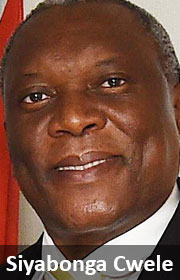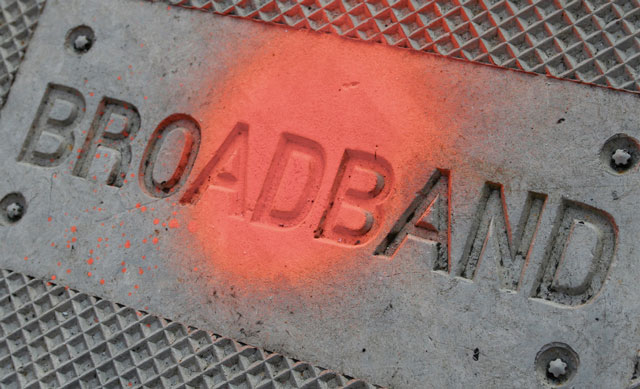The following is a shortened and edited version of a speech delivered by telecommunications & postal services minister Siyabonga Cwele in parliament on Wednesday at the debate on President Jacob Zuma’s state-of-the-nation address.
 The National Development Plan proposes three-phased implementation of priorities for the ICT sector. In the short term, the plan calls for an urgent need to review policy to improve access through competition in services; fast-tracking of local loop-unbundling; urgent availability of spectrum for next-generation services; and provision of low-cost high-speed Internet bandwidth.
The National Development Plan proposes three-phased implementation of priorities for the ICT sector. In the short term, the plan calls for an urgent need to review policy to improve access through competition in services; fast-tracking of local loop-unbundling; urgent availability of spectrum for next-generation services; and provision of low-cost high-speed Internet bandwidth.
By 2020, it calls for universal broadband penetration at a minimum speed of 2Mbit/s. After 2020, it calls for multi-stakeholder collaboration in innovation, local content and multimedia as well as in software and applications development.
The CSIR reports that in the past three years, the ICT industry has invested R78bn in infrastructure. The country has already started to see benefits of this accelerated investment. This, and other measures driven by government, have helped to steadily push South Africa’s ranking on the World Economic Forum’s Global Competitive Index from 56th in 2014 to 47th in 2016, out of 140 countries.
In September 2016, the ANC government adopted the integrated ICT white paper. We are using this policy lever to “deconcentrate” the industry. We will use open-access networks and spectrum as strategic levers to induce real transformation and lower barriers to entry for blacks, small businesses and marginalised groups.
We have been heartened by positive inputs from the industry during consultations that have taken place since November on how best we implement the white paper. Those who are currently excluded are not vengeful. They brought the most innovative proposals to implement the policy without destroying the sector. This confirms the president’s assertion that it is not about taking from the “haves” but the sharing with the “have-nots”. We will finalise consultation soon to prioritise implementation and introduce necessary legislative and regulatory changes without delay.
In October 2016, the ICT Sector Council finalised new ICT sector codes for black economic empowerment, which are now operational. These codes move beyond share ownership and management control to prioritise other areas such as enterprise development, preferential procurement and skills development. The ICT Sector Council is assisting the industry to improve compliance and to eliminate fronting. The council is on provincial roadshows to assist the beneficiaries to take advantage of the new opportunities presented by government.
Broadband roll-out
Broadband is critical for a development and global competitiveness.
Following technical procurement delays and a failed State IT Agency tender process for phase one of broadband roll-out, we have decided to utilise the capacity of state-owned companies to implement it in line with the provisions of the law.
The aim is to connect government offices to expedite delivery of services to our citizens. It also aims to bring these services closer to our communities so that they can be exploited by local business and citizens.
With regard to the bigger Phase 2 roll-out to the rest of the country, later this year we will raise funds through our partnership with the private sector as part of the InvestSA 40 priority projects.

Since 2014, state-owned companies have invested in broadband infrastructure in rural areas. For an example, Broadband Infraco is using its points of presence to connect local small, medium and micro enterprises to provide services to end users. Black-owned companies such as Galela and Mzinyathi provide services in the underserviced areas of Dr Kenneth Kaunda and Mzinyathi districts, respectively. This allows smaller businesses to create new local jobs.
Universal service agency Usaasa has employed the service of another small black-owned company, BrightWave, to build, operate and then transfer a network at King Sabata Dalindyebo and Mhlontlo municipalities in OR Tambo District. By July 2017, we plan to finalise connecting 542 schools and 65 clinics and municipal offices.
The cost to communicate
Our youth have realised the power of using the Internet for their development. We have heard their pleas to make data affordable as it is still relatively high compared to our peers. We agree with them: data prices must come down.
What are doing to achieve this?
Firstly, the real fall in data costs will be realised when more players, including small businesses, are competing in giving services to the people as advocated in the white paper.
Secondly, in 2016, I issued a policy directive mandating the communications regulator, Icasa, to conduct an inquiry to determine if there is effective competition in the broadband market and recommend corrective remedies or regulations to bring down prices. Icasa has agreed to a deadline of April 2017 to do this work. We hope the public will give their valuable inputs in this process.
Thirdly, Internet service providers are expanding Internet exchange points to more towns in South Africa, lowering the cost of providing access.
Finally, the roll-out of municipal Wi-Fi contributes significantly to providing basic access to many citizens. We have assisted municipalities, starting with metros, to expand this programme. We were concerned by pronouncements by new Democratic Alliance and Economic Freedom Fighters mayors that threatened such projects in some of the metros. We are encouraged by their change of heart because of pressure from residents.
The ANC government will continue assisting more municipalities in this regard.

